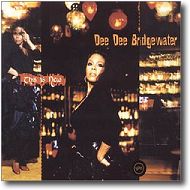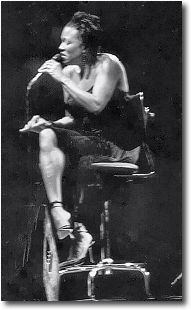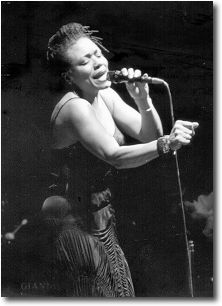|
That's Dee Dee!
Bari,TeatroTeam - 11th December 2002
by Marco
Losavio
|
 |
Dee Dee Bridgewater - vocals
Ira Coleman - double
bass
Thierry Eliez - piano,
B3 Hammond organ
Minino Garay - drums
Jean Marie Ecay - guitars  The last work by Dee Dee Bridgewater, This Is New,
Verve Universal, is entirely dedicated to Kurt Weill's music. The last work by Dee Dee Bridgewater, This Is New,
Verve Universal, is entirely dedicated to Kurt Weill's music.
German composer (1900-1950), he studied with Humperdinck and Busoni. In Germany, he
met with Bertolt Brecht , who wrote several librettoes for his music (the
"Threepenny Opera"
,
Happy End
...). He first went to Paris, then, in 1935, in the United States. There he met
Ira Gershwin , who provided him with memorable texts like
Lady In The Dark
(from a libretto by Moss Hart), which was a huge Broadway success with 777 performances. Several others then followed it, among others, perhaps,
Lost in the Stars
,
Street Scenes. But this is history, and the show is about to begin.
9:15 p.m. Lights are punctually turned off and the first notes emerge in the hall. This journey about Kurt Weill's music begins, with the gorgeous Dee Dee Bridgewater as captain. We have only to sit down, fasten our belts and trust it.
 From the very first notes, we feel tonight we'll have the chance of listening to different sounds; indeed, it starts with latin, funky and swing elements in the first two pieces I'm a stranger here myself ("One Touch of Venus", 1944
) and the legendary September Song ("Knickerbocker
Holiday", 1938). On
September Song
Thierry Eliez plays the warm B3 Hammond, unfortunately not with a much balanced, although still effective, volume. Then it's the turn of My Ship ("Lady in the Dark", 1941), another standard tune played commonly by jazz musicians. Dee Dee remembers us how this tune became a famous standard, also because it was often sung by Ella in a duet together with Joe Pass. Her proposal has been even more intimistic, a duet with Ira Coleman 's double-bass, who, with deep notes and a right sustain, has been able to hold tight both harmony and the slow, veiled rhythm in a most delicate ballad. Here Dee Dee, sitting on a chair-stool, has climbed the melody notes controlling every phrase, without ever making the performance lose the tension such a duet can create. From the very first notes, we feel tonight we'll have the chance of listening to different sounds; indeed, it starts with latin, funky and swing elements in the first two pieces I'm a stranger here myself ("One Touch of Venus", 1944
) and the legendary September Song ("Knickerbocker
Holiday", 1938). On
September Song
Thierry Eliez plays the warm B3 Hammond, unfortunately not with a much balanced, although still effective, volume. Then it's the turn of My Ship ("Lady in the Dark", 1941), another standard tune played commonly by jazz musicians. Dee Dee remembers us how this tune became a famous standard, also because it was often sung by Ella in a duet together with Joe Pass. Her proposal has been even more intimistic, a duet with Ira Coleman 's double-bass, who, with deep notes and a right sustain, has been able to hold tight both harmony and the slow, veiled rhythm in a most delicate ballad. Here Dee Dee, sitting on a chair-stool, has climbed the melody notes controlling every phrase, without ever making the performance lose the tension such a duet can create.
The absolute silence of the public breaks down at the end with a loud and right applause.
Now it' s tango. It's the time of Youkali, with a French text, bandoneon sound and argentinian rhythm. Undoubtedly, a tribute to South America, to its sounds and culture, but also to France, Dee Dee's second home. All this is a prelude to the splendid Speak Low ("One Touch of Venus", 1943
) performed with a slight beguine. Here, after the theme exposition, young guitarist Jean Marie Ecay performs a very beautiful solo, preceding though an absolutely extraordinary improvisation by Dee Dee. She uses her voice like a trombone, modulating notes just as a trombone would do. She breaks the sound and makes it vibrate, she holds the notes as if she had a slide. Absolutely brilliant.
 It's the turn of her last CD's title piece: This Is New ("Lady In The Dark", 1941). Dee Dee invites us at dancing samba with her and gives four to start. Dee Dee dances, Dee Dee sings, she is just one thing with this music, she dominates the harmony, texts are pronounced very clearly, sentences are even played emphasizing the meaning of words with the dynamics of her voice. Here hammond comes back again in a very fascinating solo, then finally there is a crescendo with solos by drums and percussions,
scat
by Dee Dee, where South America and Africa are mixed together, until the final unison, perfect. It's the turn of her last CD's title piece: This Is New ("Lady In The Dark", 1941). Dee Dee invites us at dancing samba with her and gives four to start. Dee Dee dances, Dee Dee sings, she is just one thing with this music, she dominates the harmony, texts are pronounced very clearly, sentences are even played emphasizing the meaning of words with the dynamics of her voice. Here hammond comes back again in a very fascinating solo, then finally there is a crescendo with solos by drums and percussions,
scat
by Dee Dee, where South America and Africa are mixed together, until the final unison, perfect.
Now Dee Dee introduces a piece she wants to dedicate to a great jazz musician, whom she considers a sort of spiritual father, also because of his closeness to Ella.
He's the unforgettable Ray Brown and the piece is Here I'll Stay ("Love Life", 1948). Classical guitar and voice create a greatly fascinating atmosphere. After the theme exposition, the rhythmic base also starts, allowing thus the guitarist to come out with a very intense solo.
The saga of Jenny ("Lady In The Dark", 1941), one of her pieces which, personally speaking, I liked the most,
is something we can define as a "very nice song". Dee Dee introduces this piece, remembering us how the musical protagonist suffered from depression and tried to get out of it telling her dreams to a psychoanalist. In this piece, then, there are all the aspects of a personality who denies, even if ironically, the label of "mad". We can feel the
musical
in Weill's music, with continuous tempo, and therefore expressivity, shiftings: swing, then bossa, then swing again, it doubles, it halves, until it lands on a blues and then on a final shuffle. Great voice, great black voice. An excellent interpretation, which asked not only for singing, but also for acting skills. Dee Dee has been able to make this music her own, communicating all the emotional intensity
that it's possible to find histories of the Weill music. She has been helped a lot by her musicians, who have joked with her on the stage, playing the choir part in a "lyrical" way and hardly holding themselves from laughing...We feel there is such a joy to perform this music, that at the end of this piece, a simple "Ah, Ah, Ah" pronounced by Dee Dee, reminds her of the legendary "Ah, Ah, Ah, Ah, Staying alive". In this way Dee Dee incites her band at following her in a dance improvisation underscored not only by her voice but also by dancing. Then she invites Eliez at taking a bit of deserved applauses, if we consider that Eliez is co-arranger of this CD together with Cecil Bridgewater. Everything is being done
punning on the lines ambiguity "Stay in the light" and "Staying Alive". A great leader, Dee Dee, a real stage queen.
Always with a very humorous vein, a surprising and joyful aspect, she introduces us the piece Lost in the stars ("Lost in the Stars", 1944) imitating a young débutant who, with a delicate little voice
and a little clumsy in the movements, lingers and wanders between words. The piece starts with Thierry Eliez 's piano, everything is performed with an excellent dynamic control, with a profound respect towards a delicate history of apartheid.
 Another piece
that Dee Dee feels very much: Bilbao Song ("Happy End", 1929). A very beautiful intro with percussions and drums beats the dominant tempo, a flamenco, straightaway underlined by Dee Dee both with vocalizes and dance movements. Then
the melody begins with a classical guitar accompaniment. An excellent performance. Another piece
that Dee Dee feels very much: Bilbao Song ("Happy End", 1929). A very beautiful intro with percussions and drums beats the dominant tempo, a flamenco, straightaway underlined by Dee Dee both with vocalizes and dance movements. Then
the melody begins with a classical guitar accompaniment. An excellent performance.
We are towards the end; after Spain, now it's the turn of America with Alabama Song ("Mahagonny", 1928). A '60es shuffle played also by Doors. The atmosphere is very joyful and the rhythm helps beating the notes of this song and gives it energy. The first solo is by the Hammond, with such a beautiful percussive effect it seems almost like a marimba. Everything then follows in a crescendo; in this shuffle, the organ is "perfect". Actually, Thierry Eliez unsheathes a great beautiful solo.
This is the prelude to the scat by Dee Dee, beaten rhythmically by Hutchinson and Garay , who follow her, creating almost a very fascinating rhythmic unison, without betraying though the original
intention of the song. Thus Dee Dee uses the scat to introduce the soloes by the other musicians, moving on the stage and coming near to them: first the guitar and then the double bass. A beautiful duo begins with Ira Coleman and Dee Dee. Dee Dee improvises on
the
walkin'
by Coleman, counterpointing and following it: it takes very deep notes, then it rises again,
it gets faster, it gets slower, it gets more
delirious, reminding of its blues spirit and leaving more room to the double bass, until they begin a
fast swing together, where
the
walkin'
is the base for Dee Dee that improvises in a very
Fitzgeraldian way: that's the Dee Dee the audience loves more. Anyway, it's not finished yet because it's also the time of
Hutchinson, who finally offers us a solo reminding the theme with the beat of his drums. Great finale and well deserved applause from the audience who, obviously, wants a bis.
The group comes back again and performs, in front of a standing audience, an unexpected tribute to another great musician: Charlie Christian! With the metronome at 300, it takes all Dee Dee's scat ability to perform at the unison with the guitarist the theme of Airmail Special without ever
losing half a note: very good! Obviously, they improvise and I think that the
Ella always and forever present in Dee Dee's heart has finally come out
overbearingly. It's a part of her, even if she talks of it almost humbly, even if now she wants almost to escape from it, but for her Ella is jazz and Dee Dee is jazz.
Roaring applauses for the energy communicated, the extremely high performance level, the great rapture and passion for this music, for their work.
Not still run out all the strengths, Dee Dee surprises both the audience and her journey mates,
and sings "Amazing grace". A gospel readily underlined by Eliez's hammond. She sings it vigourously, angrily, with the body and with the voice, because it's an hymn to peace, love, an invitation to non-violence, which all of us take and make us our own; we thank her once again for this important message.
The concert has really finished, people still sing and hum in the theatre, while going away, while others keep on dancing; all agree it's been an extraordinary event. For my part, I keep staring at the void stage and think about the greatness of that woman I had the honour of meeting and interviewing before the concert. Her voice still echoes among the walls of this theatre, it will not forget her so easily;
her voice certainly is numbered among the voices that cannot not be recognized:
in fact, we just have to listen to it for just one moment, to say unmistakably: That's Dee Dee!
Insert an opinion
|
© 2000 - 2026 All the material published on Jazzitalia is exclusively owned by the author. Moreover it is protected by International Copyright, so it is forbidden any use of it which isn't authorised by the rights' owner.
|
This page has 3.823 hits
Last Modified Date: 27/12/2002

|
|

